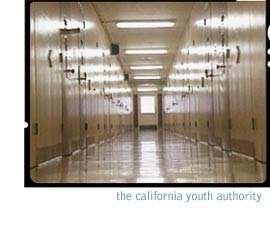

 Should teenagers who commit violent or serious crimes be tried as juveniles or
adults? Can we rehabilitate these young people to prevent
future criminal behavior?
Should teenagers who commit violent or serious crimes be tried as juveniles or
adults? Can we rehabilitate these young people to prevent
future criminal behavior?
With almost unprecedented access to juvenile court proceedings--which are usually
closed to the public and rarely seen on television--"Juvenile Justice" follows
four youth offenders through the Santa Clara County, California juvenile
courts, observing how the criminal justice system treats their cases and
determines their fates. Filmed over 15 months, this report also talks with the
judges, case workers, prosecutors and families of the young teens as well as
some of those who were their victims.
We meet Manny, 17, charged with the attempted murder of a pregnant woman and
her family; José, a 15-year-old gang member sentenced to Juvenile Hall
for his role in the beating death of another teen; Shawn, a middle-class
white teen who pleaded guilty to trying to murder his father; and
Marquese, an African-American teen who has seven felonies on his record, all theft related.
"While their crimes are different and they come from diverse backgrounds, these
four teens are all united by the fact that they each are at a crossroads in the
system," says FRONTLINE producer Janet Tobias. "One road leads to
rehabilitation in the juvenile system; the other leads to punishment in the
adult system."
In the past decade, nearly every state in the union has passed laws or
amended legislation to make it easier to prosecute and sentence children as
adults. Proponents of these tougher policies say they're fed up with a system
that offers little more than a slap on the wrist to children who commit serious
crimes. Some even question whether repeated attempts to rehabilitate habitual
youth offenders is serving the interests of overall justice.
But others aren't so sure. FRONTLINE interviews juvenile court judges and
attorneys, who, although disagreeing on some points, do agree that decisions
about which kids to treat as kids and which should be sent to adult court are
very difficult.
Former public defender Bridgett Jones is one who believes the system needs to
distinguish between juvenile and adult offenders. "Children are not little
adults," she says. "They think differently. They respond and react to things
differently than adults do...So why should the consequences be the same as for
an adult?"
California prosecutor David Soares disagrees. "The voters in this state and
the legislature have decided that in fact there are many 15-year-olds and
16-year-olds and 17-year-olds and 18-year-olds who are as intellectually and
criminally sophisticated as adult offenders," he says. "And the decisions that
have been made by our lawmakers and by the voters are that we look at their
actions and [determine] are they engaging in the actions of an adult."
At issue is whether the juvenile justice system has been--or even can
be--successful in rehabilitating young criminals. And if they can be
rehabilitated, will it be enough to regain society's trust? It's a question
even some youth offenders have trouble answering.
"Even if I want to change, people are still gonna look at me like I'm a
gangster," says Manny, the teen charged with attempted murder.
Therein lies the problem, says public defender Jones says. "The only thing
that's going to work with kids like [these] is a willingness of the community
to redeem them and saying, 'Look, your life's not over, there's still hope for
you.'"

manny · shawn · marquese · jose
from both sides of the bench · facts & stats · related report: little criminals
discussion · synopsis · press · tapes & transcripts · credits
FRONTLINE · wgbh · pbs
web site copyright WGBH educational foundation
|